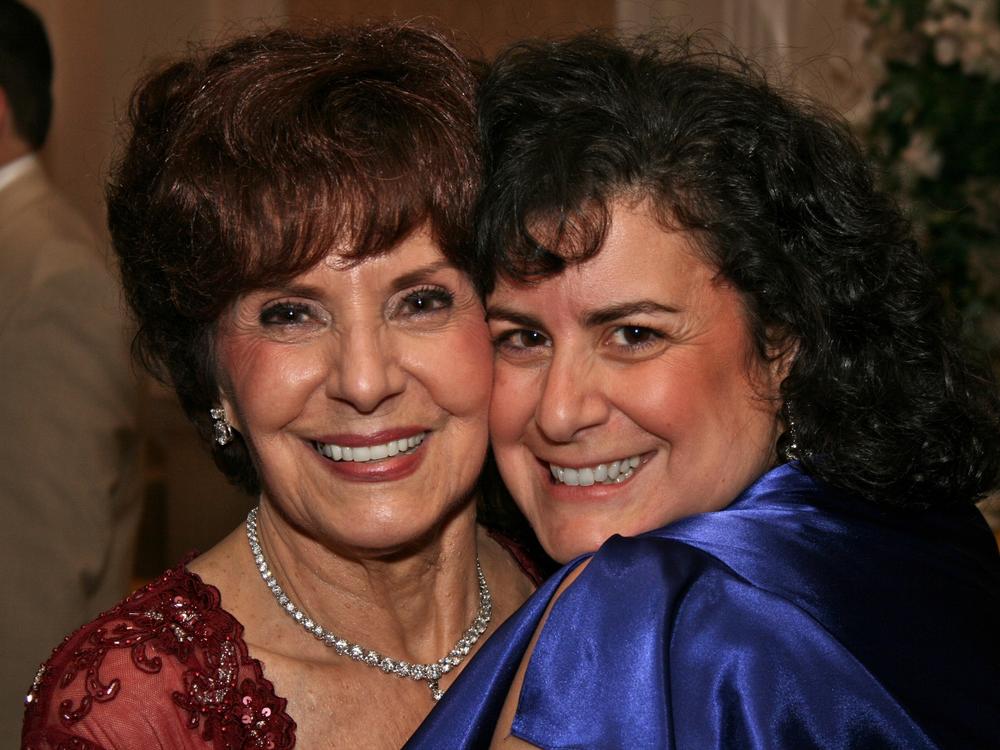Section Branding
Header Content
Medicare explores a new way to support caregivers of dementia patients
Primary Content
At 80, Rose Carfagno of West Norriton, Pa., was charming, social and independent, still working as a hair stylist and going ballroom dancing every weekend.
“She would work three days a week, and then she would dance Friday night, Saturday and Sunday,” said her daughter Rosanne Corcoran.
But over the next few years, Carfagno started showing signs of dementia. She struggled to remember to eat dinner, pay her bills and take her blood pressure medicine. She stopped working, stopped dancing. When the older woman fainted in 2015, Rosanne decided her mom needed to move in with her and her husband and their two kids, a few towns away.
“To scoop her up and bring her back to my house and say, ’Mom, you can't go home again’ is heartbreaking because I'm taking something away from her,” Corcoran said. “I'm not — the disease is, but it sure does feel like I am.”
As Carfagno’s mental and physical losses continued, the burden on Corcoran grew. She bathed and dressed her mom as well as the kids each day, took her to myriad doctors’ appointments, talked her through delusions in the middle of the night. Every day, fresh chaos.
“It's the complete and utter, overwhelming feeling of never being on top of it,” said Corcoran. “Of never knowing enough and not thinking that you know enough.”
Rosanne Corcoran is just one of many family members and friends who do the vast majority of hands-on care for the nearly 7 million Americans living with Alzheimer’s disease and other dementias. According to the Alzheimer’s Association, all that unpaid work adds up to 18 billion hours a year, often saddling caregivers with their ownfinancial stress, depression and other health issues.https://www.alz.org/media/Documents/alzheimers-facts-and-figures.pdf
“I can tell you,” Corcoran said, “every caregiver is drowning for more help.”
In hopes of easing that burden, Medicare, the federal government’s health insurance program for people 65 and over, is launching an eight-year pilot project this summer with a groundbreaking plan.
The government will pay to directly support the caregivers of people living with dementia. Medicare is betting that investing in caregivers will pay off by helping keep patients with dementia healthier and happier, without exhausting their families emotionally and financially.
Help in the trenches
Medicare’s pilot, called Guiding an Improved Dementia Experience – or GUIDE –is modeled on a handful of promising, smaller programs linked to academic institutions, including UCLA, UC-San Francisco, and Emory and Indiana universities.
In Medicare’s version, each family will get a care coordinator — a sort of coach trained in dementia care, who knows the patient and the caregiver and can offer guidance and troubleshoot problems before they escalate. The coach or other member of the care team will be on call, 24/7. They will also help coordinate doctors visits and identify some adult day care or in-home care for the patient for up to a few hours a week, to lighten the caregiver's load.
“We've never tried anything like this before,” said Liz Fowler, Director of the Center for Medicare and Medicaid Innovation.
“The magic comes from the care coordinator who works with the patient outside the office … in the home, in the community, with the caregiver,” said Dr. Malaz Boustani, founding director of the Sandra Eskenazi Center for Brain Care Innovation, and one of the pioneers of this approach to dementia care.
As Boustani explains it, even as the patient continues to decline mentally, the care coordinator helps them and their families manage other symptoms that come along with dementia, such as agitation, depression, sleep disturbances.
Boustani has seen firsthand how helpful this type of support can be.
A randomized controlled trial of the program at Eskenazi Health, the hospital in Indianapolis where his program is based, found patients had fewer symptoms of dementia, and caregivers reported lower stress. Studies of similar programs at UCSF and UCLA found that patients had fewer emergency room visits and were able to continue living at home longer.
Avoiding expensive preventable hospitalizations and keeping patients happily at home and out of nursing homes longer are two goals of the Medicare project. Right now people who have dementia cost Medicare almost three times as much as other patients.
New strategies to ease stress
Cindi Hart, a caregiver in Indianapolis, attributes her ability to keep her mom out of a nursing home to the dementia program based at Eskenazi Health. That’s where Hart met her mom’s care coordinator, Lauren Sullivan.
“She was teaching me how to swim, how to tread water, how not to to gulp in the water of my mother's illness,” Hart says of Sullivan.
Hart’s mom, Sydney Pfaff, 80, a retired nurse, was reluctant to give up control of her daily medications. But after Hart saw pills scattered all over the floor of her mom’s apartment one day, she tried to appeal to her mom’s sense of reason.
“She is walking through her apartment with the pills falling out of her hands,” Hart recalls. “And she's like, ‘Oh, no, I take them, I take them. I know what I'm doing.’ She was uncharacteristically belligerent and irate, to the point where she was screaming and her eyes were bulging,” Hart said.
The arguing went nowhere. On the way home, Hart called Sullivan, their care coordinator, who advised Hart to stop trying to reason with her mom. Pfaff was losing her ability to problem-solve and organize herself, Sullivan explained, though she’d always prided herself in exactly those qualities.
Hart now cites that conversation as a breakthrough moment.
“In my heart I thought that my mother still had the ability to be logical,” Hart said, “It was a huge step — the program helped me understand that her logic has gone.”
With Sullivan’s help, Hart created a set of alarms and automatic pill dispensers to keep her mom on her medication regimen, while still letting her take the pills on her own.
It worked for years.
Recently, with the dementia advancing, her mom moved from her own apartment to a nearby assisted living facility, where a nurse now comes by to help Pfaff take her meds. When Hart visits her mom several times a week, they no longer argue. They go on walks.
Lauren Sullivan continues to check in regularly and field Hart’s questions as new challenges arise.
"Many of our patients don't actually pass away from dementia," Sullivan said. "The majority of them can plateau and stay pretty healthy for a long time."
Eligibility for Medicare’s caregiver program is limited – for now
Medicare has yet to reveal exactly which health systems will be included in its pilot project, or how many families will be eligible; the agency promises more details in early July. In the meantime, Medicare has spelled out some eligibility criteria for patients:
- The patient must have a dementia diagnosis.
- They must have traditional Medicare insurance — that’s only about half of people over 65. Seniors on a Medicare Advantage plan aren’t eligible.
- The patient must be living in their own home, in a family member’s home, or in an assisted care facility — but not in a nursing home.
All told, U.S. taxpayers are on track to spend around $231 billion on dementia care this year and that figure is only expected to rise in the coming decades. Medicare’s theory is that by investing in caregiver support, dementia patients will continue to live at home longer and avoid unnecessary hospital visits, which is expected to save the government money. If the availability of a program like this were expanded to eligible patients , one estimate suggests it could save as much $21 billion over the next decade.
Anne Tumlinson, CEO of ATI Advisory, a firm that consults on aging issues, questions whether the program will actually save money. “When you have a family member with dementia, your needs are bottomless,” she said. And whether these supports will keep most patients out of nursing homes is up in the air, too.
“It may help them a lot, and yet still not necessarily be the thing that prevents them from ultimately deciding, ‘You know what? I just can't do this anymore. And I need a nursing home.’”
Even with those limitations, the fact that Medicare will be starting to fund these sorts of programs at all is big news in the world of dementia care.
“I wept,” said Dr. David Reuben, director of UCLA’s Alzheimer’s and Dementia Care program, describing how he felt when he heard about Medicare’s plan. “I wept because of all of the people around the country who are going to get the services they need paid for.”
The UCLA model serves around 1,000 people right now, Reuben says, but without full payment from Medicare or other insurers, has been operating at a loss.
Medicare’s decision to pay for comprehensive care like this could spur interest among other insurers and hospitals, Reuben and other dementia experts say. Liz Fowler, of Medicare, said she’s already heard from hospitals and doctors interested in adopting some of the components of the program.
“Where goes Medicare, goes the rest of the country,” Fowler said. “That's great news, because it means an expansion of this approach to care.”
‘The hardest thing I’ve ever done’
Family caregivers like Cindi Hart and Rosanne Corcoran say this sort of recognition and support are long overdue.
Since her mom died three years ago, at 92 years old, Corcoran has worked with caregiver support groups, and started a podcast on how to help a loved one through dementia.
“I absolutely adored my mother. I would have carried her on my back if I had to,” Corcoran said. “And it was still the hardest thing I've ever done.”
This story comes from the health policy podcast Tradeoffs. Dan Gorenstein is Tradeoffs' executive editor, and Alex Olgin is a senior reporter/producer for the show, where a version of this story first appeared. Sign up for Tradeoffs' weekly newsletter to get more health policy reporting in your inbox.


